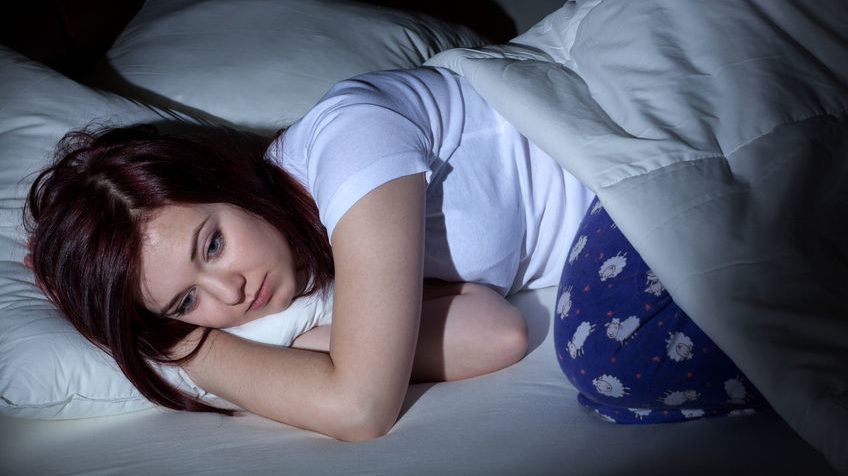
Even if you go to bed early, do you still wake up exhausted? See a list of bad habits that might be preventing you from getting a good night's sleep.
If you’re in bed for a full 8 hours but still struggle to wake up—you might not be getting the quality of sleep you need. Here, some common ways you might be sabotaging your plans to catch ZZZs.
As tempting as it is to catch up on email or go on a “Liking” spree through social media right before bed, sleep experts agree your screens are having an adverse effect on your sleep. The light emitted from your device disrupts your circadian rhythm by hindering the development of melatonin, the hormone that helps you sleep. This leaves your brain in “awake” mode even if your body is tired, which can make going to sleep difficult and reduce the quality of sleep once you actually get some shut-eye.
Put down your phone and turn off your laptop about an hour before bed, and use that time to develop a routine that brings closure to the day. This can be something like creating a “to-do” list or packing a bag for the gym.
Sometimes a cup of Joe hits the spot after dinner, but studies show that even one cup of coffee can affect your long-term sleeping patterns.
Coffee “isn’t just keeping you awake,” says sleep researcher Kenneth Wright Jr., a professor with the Department of Integrative Physiology at the University of Colorado at Boulder. “It’s also pushing your [internal] clock later, so you want to go to sleep later.”
Even decaf coffee contains 12 to 16 milligrams of caffeine, or about one-tenth of a caffeinated cup. The goal should be to eliminate stimulants altogether before bedtime.
If you need a warm after-dinner drink, opt for chamomile or passion fruit tea, both of which contain chemicals that relax your nerves and muscles. Here are some other teas that can help you sleep.
Studying stimulates the brain (as it should), but that’s not a good thing when you’re trying to relax. Even if you’re not pulling an all-nighter (which you should never do), studying late at night can result in sleep deprivation. And even one night of sleep deprivation can have serious side-effects: a lowered immune system, increased blood pressure, and reduced concentration.
Rather than finding a place to stop in your studies (like the end of a chapter), set a strict time limit for yourself and use that as your cue to go to bed. And make sure your studies are kept off your bed – your brain should associate bed with sleep, not studying or stress. If you need some ideas for a study space, check out our list here.
Sweet snacks like candy or chocolate can cause a spike in your blood-sugar levels, giving you an unwanted dose of energy before bed. When your blood-sugar levels crash, your body goes into “emergency” mode and excretes the stress hormone cortisol. And as you probably know, stress and sleep don’t mix.
So while a candy bar is tempting for the taste buds, it’s not so great for sleep. If your palate is craving something sweet or tart, go for cherries or bananas. Cherries are naturally high in melatonin, which promotes sleep, and bananas contain natural muscle relaxants like potassium and magnesium.
Spicy food raises your body’s core temperature, which has been linked to disruptive sleep, according to a study published in The International Journal of Psychophysiology. In the study, young, healthy men were given meals that contained Tabasco sauce and mustard. The study found that the men spent less time in both the light and deep sleep phases and took longer to get to sleep overall. Researchers blamed capsaicin, an ingredient found in chilli peppers.
This rule might not apply to everyone, as research from the National Sleep Foundation has found that people’s bodies react differently to the effects of strenuous exercise. But for most of us, an increased heart rate and adrenaline rush is going to make going to sleep a chore. However, there are ways to relax and regulate your body’s temperature after a late-night gym session.
Alcohol is tricky because it’s a depressant, so it seems like it would actually help you sleep better. Not so, according to sleep experts. While a few drinks can make you fall asleep faster, it disrupts your REM sleep, which causes poor concentration and daytime drowsiness.
Even worse, heavy drinking before bed can suppress your breathing, induce sleep apnea, and cause heavy snoring (which your roommate might not appreciate).
You’ve probably heard the saying, “Never go to bed angry.” And science agrees. Whether it’s a fight with a roommate or significant other – or even frustration toward yourself – try to resolve the situation the best you can before going to bed.
According to a study published in The Journal of Neuroscience, “going to sleep after experiencing negative emotions appears to reinforce or ‘preserve’ them” and that restless sleep is “the brain’s way of trying to keep the memory or emotions from being stored.”
In other words, call a truce before you snooze.
Every day must come to an end, and while YOU may know it’s time for bed, it’s important for your brain and body to be on the same page. That’s why it’s essential to have a nightly routine that tells your brain it’s nap-nap time.
A few activities you can incorporate into your nighttime routine include:
Sweet dreams!
HAMNIC Solutions is here to support your graduate journey. Our professional writing and editing expertise helps you manage your academic workload, reduce stress, and focus on well-being for a balanced academic and personal life. Visit HAMNIC Solutions to learn how we can make your student life easier and healthier, enabling you to achieve your academic ambitions without sacrificing a balanced lifestyle.